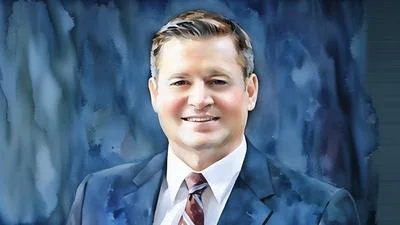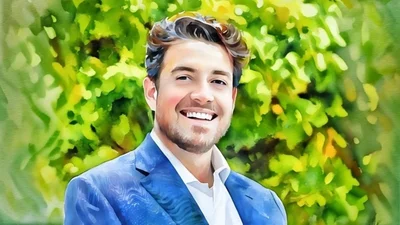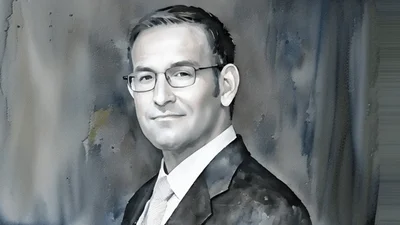Clifford May is the founder and president of the Foundation for the Defense of Democracies. He is also the weekly Foreign Desk columnist for the Washington Times.
Federal Newswire
How much time did you spend in the Soviet Union?
Cliff May
I went for the first time on a summer program between high school and college back in 1969…I then went back in ‘72 as an exchange student. Then I went back as a journalist for some time…
There was a book by Andrei Amalric called “Will the Soviet Union Survive to 1984.” Everyone thought that was just fiction. But he wasn't that wrong. Astonishing and distressing, of course, is that although the Soviet Union collapsed, it didn't become what I hoped it might become. A place like a free country, a normal country I'd go to in the summertime...
We like to think we won the Cold War. We didn't, and the reason we didn't is because the Soviet Union collapsed. The Berlin Wall fell. But the People's Republic of China continues the Cold War…It does so with Vladimir Putin's Russia as its junior partner.
It does so with the Islamic Republic of Iran as a junior partner and a growing list of other new partners, including North Korea, Venezuela, Cuba, and a list of countries in Africa that no one knows about or could find on a map…
We are in the midst of something. It's not Cold War 2.0 anymore. Either way, it is a more challenging and threatening environment than we ever had done.
Federal Newswire
Are we seeing conditions that are similar to the precursors of World War I?
Cliff May
Yeah, I don't think you're overstating the case. We all know that history rhymes, it echoes; it doesn't quite repeat. I think you can look at the precursors to World War One or Two or the Cold War.
In any case, what we are seeing is an extraordinarily threatening environment out there, to which I would argue we are not responding nearly adequately. That is one of the lessons we should be taking, by the way, from the war that is ongoing now in Gaza with Israel/ IIsrael clearly did not take seriously enough the threat posed by Hamas. They were concentrating much more on Hezbollah, which is a more strategic threat. Of course, the Islamic Republic of Iran could be nuclear-armed very soon.
One of the lessons is that you must take your enemies and their intentions seriously. You must look very hard at what capabilities they have and are developing in order to achieve their ambitions, and what those intentions suggest. I don't think we're doing that right now.
Federal Newswire
How did the Foundation for the Defense of Democracies start?
Cliff May
It started with a conversation I had with Jeane Kirkpatrick and Jack Kemp.
Jeane Kirkpatrick was the first woman U.S. ambassador to the United Nations, a Democrat who came over to work for Ronald Reagan. She was part of his security cabinet. Not all U.N. ambassadors are. Jack Kemp was a very important American politician in the House, he considered himself a compassionate conservative. He was HUD secretary. He ran for President in primaries.
I had a conversation with the two of them in September of 2001, [right around] the 9/11 attacks. Essentially, what they said to me was, “we think America is taking a holiday from history–we think we are taking a peace dividend prematurely.”
[They also said] “People think that the Soviet Union collapsed. We have no more enemies. But consider 1983. We got hit in Beirut–by whom? For what reason? In 1993, we got hit in New York City–how come? In 1996, the Khobar Towers in Saudi Arabia. In 1998, two of our embassies were blown up in Africa. In 2000, the USS Cole. Is anybody connecting the dots?”
I said, “Wow, what an interesting assignment.” I was working as a fancy consultant of some kind at that time. So I started to do this research, and within about a week, 9/11 happened. I said, “this is what you feared, isn't it?”
They said, “precisely it is, but what are you finding?”
Nobody wanted to deal with this. “Why,” they asked? I think that a big part of the reason behind these attacks on the US are not just ideological, but theological. Religion is involved and no one wants to deal with anybody's religion.
Then they said, “... create some kind of organization to look at these problems, study them comprehensively, educate Congress, the administration, the public as best we can–come up with an option.”
By January 2, 2002, we had a small office and we began to build. One of the things that I think is important, and that is that our task was simpler then than it is now. Why do I say that? Because in 2002, we were worried about Islamism and jihadism, a new word for a lot of us.
So we only had one thing to worry about. Now we have multiple things to worry about.
Federal Newswire
How are all of these seeds related to the 1979 Islamist Revolution in Iran?
Cliff May
In 1979 we had the first modern nation-state committed to jihad against the West. That's what that revolution was about. A lot of people didn't see it again. I was there as a young reporter. Most of my colleagues didn't see it. I didn't really understand it. I was skeptical of what was going on.
Keep in mind, this nation-state was Shia and largely Persian, but it still galvanized the Sunni and Arab world's interest. A lot of people in the Sunni Arab world asked, “where is the nation state committed to jihad?” It's supposed to be Saudi Arabia. But guess what? The Saudis were having too good a time shopping in Harrods, skiing inside, and drinking whiskey with their infidel buddies back in Washington. Out of that, Al-Qaeda grew.
Another thing that happened is after the revolution in Iran and after what is known as the Siege of Mecca… This was ultra-Wahhabists taking over Mecca and trying to bring down the Saudi royal family to take over Arabia. They shed a lot of blood. Eventually, the Saudis brought in the French special forces to defeat them. They couldn't do it on their own.
But the Saudis will tell you this now, they took exactly the wrong lesson from that. They said, “oh, we have to show that we are committed to jihad, to war. So what we're going to do is we're going to spend on madrassas in Pakistan that train terrorists. We're going to spend billions of dollars.” One Saudi put it to me: “what we did was we created a Frankenstein monster. Yes, it did attack you, but it's also attacked us.”
I do believe sincerely that the current crown prince, whatever you say about him, understands this is not the way to go, not for what he wants to do.
Federal Newswire
Is the CIA’s failure to foresee the Iranian Revolution and the Soviet invasion of Afghanistan tied together?
Cliff May
Yes, they absolutely are. We supported these jihadis fighting the Soviets. We didn't really understand their ideology. We can also say, if you want to be generous, it was an experiment. We're going to support them in their liberation movement against the Soviet Union. Maybe they'll say as a result, “the Americans aren’t so bad, they don't want to rule us. They didn't want the Soviets to rule us. They're actually our friends.”
If you understand their philosophy, ideology, and theology, you know, they will have to turn on us eventually.
Federal Newswire
How does your organization define democracy?
Cliff May
People sometimes get this wrong; the FDD is the Foundation for Defense of Democracies–not democracy. What do I mean by that? I mean free societies, the free world. Democratic societies that are under siege by anti freedom, anti-democratic elements. That's what we were. That's what we're trying to defend.
I do think the United States should be pushing for basic freedoms; but setting up a democratic society is a much more complicated endeavor. This gets to one of the arguments I had with Condi Rice, which is to say that elections alone do not make a democracy. So when she pushed for elections in Gaza, I said, “Look, if you cannot have a newspaper with an op-ed or have somebody stand on a soapbox and say, ‘vote for me and I'll bring you peace and prosperity by making peace with the Israelis.’ If you won't live to see the sunrise or the next day, then you can't have an election.”
Her view was, well, you have to start somewhere, don't you? I said, “Yes, you do and you start with basic freedoms. You don't start with elections that have no political parties or be one political party, in which everyone who's there is well armed.”
What would be the major asset of a democratic society is not that it eliminates conflict. Quite the contrary. All a democratic society can hope to do is channel conflict into nonviolent expressions.
Federal Newswire
How do we imbue local traditions and customs into these new systems of freedom?
Cliff May
I would say that we can only be so helpful. What I mean by that and my views have changed on this over the years, but based on experience, I don't think we can export democracy. I don't think we can implant democracy in soils.
I do think the best we can do is we can identify those fighting for freedom and democracy in other places and give them our support, but they have to do it themselves. We cannot do it for them. I don't think the National Endowment for Democracy and the people over there have figured out a system to get democracy working in these countries. We can't do it for people. They have to figure it out on their own. We can be helpful. That's as far as we can go.
Federal Newswire
Where did the disconnect begin with Republicans questioning the role of the United States in protecting institutions of freedom?
Cliff May
Well, I'm a little puzzled. It's interesting to me and odd that you have Republicans who absolutely are very supportive of Israel in its fight against Hamas, but they don't see that Putin taking over Ukraine would also be detrimental to the West. They do see probably that China taking over Taiwan would be detrimental to the West, but they don't see how all this is wrapped up.
Tucker Carlson can say for example, Ukraine let Putin have it. I have some understanding of who Putin is after all these years, and what he's trying to do is not crazy. What he wants to do is restore the Russian empire. I think he thinks that his obligation in life is to restore order. He can't do that unless he subjugates the Ukrainians and turns them into 40 million new Russians. Now, I don't think he's done at the end if he achieves that, I think he has much more that he will believe he has to do.
The problem is that the Ukrainians want self-determination. They do not see themselves as Russians. We used to believe in self-determination of nations. Did we fight a war in Kuwait because [it was] such a wonderful society? No. Under the international order we've been trying to establish after World War II, you don't get to wipe nations off the map.
Federal Newswire
How are nations like China and Russia using Western classical liberal society against us?
Cliff May
The most obvious example is the United Nations. We set up the United Nations right after World War II with the idea that we would establish…international order. It's very hard for us to show what that is because it just kind of exists.
We were trying to say, “hey, if we all obey certain ground rules, wouldn't it be better for everybody? Can we do it this way? What [if] China wants to dominate the world. “This is not awesome,” Americans think. Why would they want that?”
From Genghis Khan to Alexander the Great to Napoleon, this has always been the ambition of people who thought they were great. We're the first ones who don't want to dominate the world. We want to be a little bit more influential than others. But we're not going to take any property, territory, [or your resources]...We're going to buy it from you at a fair price.
Even so, China, Russia, Iran, and others say, “no, we don't want America in control. We want America either destroyed or diminished.”
Xi Jinping wants to run Asia and then the world. That is his ambition. As I say, Vladimir Putin wants to reestablish the Russian empire. That's what he can do in his lifetime. Maybe after that, there'll be more.
Will there be conflicts between Russia and China in the future? I think so. They share a border. A lot of what we call Russia is not Russia at all. It conquered territories in the Far East. Russia has a low population. China has a large population. They're going to push it. But that's a few decades ahead.
The Islamic Republic of Iran wants to be the superpower of the Muslim world. It wants to do more than that. It wants to reestablish the caliphate, except to be really precise. If you're a Shia, it's an imamate, not a caliphate. But it's not real. All of them say, “well, what's stopping us from achieving our ambitions?” The answer is three words; the “United States of America.”
Federal Newswire
There are various theories to what Putin and Russia wants out of this conflict, from the third Rome theory, or the Imperial theory, but what is your theory?
Cliff May
He will go for Moldova as a low hanging fruit after [Ukraine]. I think he would also try to build up strength and try to take on NATO more directly. I would do that if I were him, and establish a land bridge to probably southern Lithuania to get to the one province that he has from the Germans [so he has] protection on the other [side of the] Baltic which is where his Baltic fleet is.








